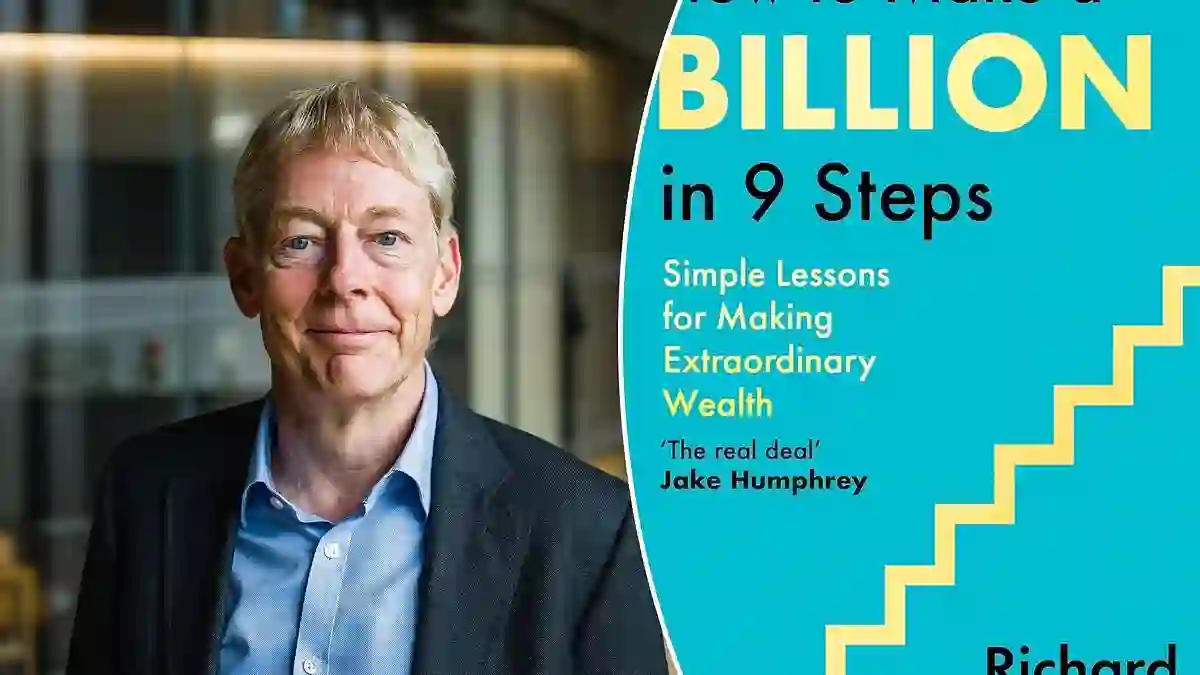Let’s be honest—who hasn’t daydreamed about becoming wildly wealthy at some point? You picture the private jets, the waterfront home, maybe even a yacht or two.
So when a book titled How To Make A Billion In Nine Steps lands in your hands, curiosity is guaranteed.
After all, why settle for a million when you can shoot for a billion—and with fewer steps?
That’s the pitch entrepreneur Richard Harpin offers in his latest book, and yes, it’s as ambitious as it sounds.
But instead of empty promises and flashy hacks, Harpin delivers a surprisingly grounded and insightful guide to building serious wealth, backed by real-world grit and a few entertaining stories.
From Selling Conkers to Building a Billion-Pound Business
Harpin, now 60, wasn’t always flying helicopters and negotiating billion-pound deals.
He actually got his start as a schoolboy in Newcastle, selling conkers to classmates.
That early hustle evolved into a more profitable venture: tying fishing flies, which he sold to local anglers.
That small business eventually earned him enough money after university to buy a car and put down a deposit on a house.
Fast forward a few years, and Harpin teamed up with a friend, Jeremy Middleton, to co-found HomeServe in 1992 with just £50,000.
It was a modest start, but by 2023, they sold the business for a staggering £4.1 billion.
Not bad for someone who began by selling feathers and string.
Step One Copy Smart, Then Pivot Fast
One of Harpin’s biggest lessons is this: don’t try to reinvent the wheel.
According to him, copying what already works is not only okay—it’s smart.
HomeServe, for instance, was modeled after a water company’s plumbing insurance plan, reimagined after his original emergency plumbing venture flopped.
That’s what he means by “copy and pivot.”
In another example, his fishing fly feathers ended up becoming fashion accessories—literally.
He noticed a trend, pivoted, and launched an earring business cheekily named “Hookers.”
Competing Isn’t the Enemy, It’s a Green Light
Harpin dismisses the idea that you need a completely original idea with no competitors.
In fact, he says competition proves there’s a market worth chasing. If someone else is already doing something similar, it means the demand is real—and there’s still room to grow if you do it better.
Billionaires Don’t Go It Alone
While some imagine successful entrepreneurs as lone-wolf visionaries, Harpin credits much of his journey to mentors and advisors.
He believes strongly in seeking feedback—even the uncomfortable kind. That humility, paired with ambition, seems to be a recurring theme.
And, occasionally, he does show off. Like the time he was determined to hire a top executive and pulled out all the stops: private flights from Buenos Aires to Miami, a luxury boat ride, and even a helicopter tour that flew right over Gloria Estefan’s house.
Because why not?
Yes—he flies helicopters, and reportedly even lent one to former Prime Minister Rishi Sunak on occasion.
Mistakes, Bailiffs, and a £30 Million Fine
But the book doesn’t skip over the tough stuff. In fact, Harpin is candid about his early financial struggles, maxed-out credit cards, and even having bailiffs knock on his door.
Later, HomeServe faced regulatory trouble and was hit with a hefty £30.6 million fine from the Financial Services Authority.
Harpin includes that chapter in full, alongside brutally honest quotes from colleagues—one of whom said, “A lot of his ideas are good, but they’re mixed in with a good amount of garbage.” Ouch.
All Business, All the Time
Harpin is the definition of someone who lives and breathes entrepreneurship.
He listens to audiobooks at 1.4x speed to absorb more ideas, spends Sunday evenings reviewing his week in detail, and treats business planning like a lifestyle.
So no, this book isn’t a breezy “get-rich-quick” read. It’s more like a blueprint for the kind of obsessive, relentless effort it takes to make it big.
Harpin even says that half of all entrepreneurs are likely born, not made—a hard truth for anyone hoping to build an empire through books alone.
Will This Book Make You a Billionaire?
Maybe. But probably not. Because here’s the thing: success, especially on Harpin’s level, takes more than steps.
It takes timing, instinct, energy, and yes, a good bit of luck.
Still, How To Make A Billion In Nine Steps is packed with stories, takeaways, and just enough outrageous anecdotes to make the journey feel inspiring—even if you’re only in it for the conkers.



